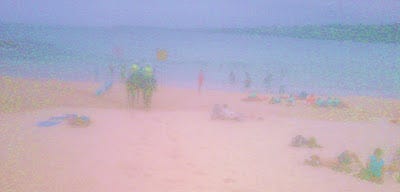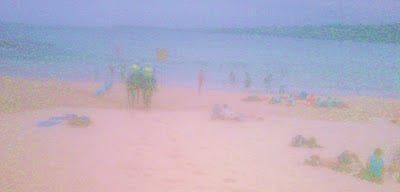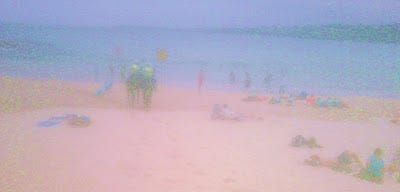*

And then it all came crashing down. A hand was gripped around his throat as he was shoved up against the pub wall. He could feel his heart thumping manically, and all of a sudden he was more frightened of a heart attack than of the man threatening him. "I'll knock your block off and chainsaw your house," the carpenter said, the man he had picked out from all the local yokels to sand his floor because he had seemed the most normal. When he had met him he had been working on another woman's house; and it seemed as if for once one of the locals was not on welfare and was actually working for a living. Such was not to be. The dignity of work was not for these people. The erosion of so many tiny Australian communities through the corrosive impacts of passive welfare and easy government money was almost complete.
It never occurred to any of them that someone else had go to work so that they could sit on their four acre blocks mopping up welfare and popping out endless numbers of children. Some of them almost never left their lots, bonging on and drinking on and king of their own domain, the bull male, the boss of some harried submissive girl - the like of which you would never find in the cities these days. Whatever you say dear hadn't been heard for a long time. How can I make you happy? I don't think so.
I'll knock your block off and chainsaw your house, the thug repeated, and he couldn't think, as he reverted to his training on solving conflicts, exactly how to behave. Submissive? You have no idea who you're dealing with. Go right ahead, I'll happily see you in jail for assault. They were thugs, proud of their loose cannon reputation. And so everything went crashing down, and the surf roared in his brain. The cousin, Philip, intervened, come on guys, come on, back off. And as the hand let go of his throat, he tried to calm his beating heart, but it kept on pumping wildly.
He went to sit in the public bar of the Tambar Springs hotel, and sat there, looking across at another builder he had talked to years ago; and said, wryly, I should have asked you to do it. The man grunted into his beer, reluctant to get involved. He ordered another lemon squash, because the lunatic was still outside in the corridor where he had left his last drink and he didn't want to go out there again. Not yet. Not ever. Oh calm thy beating heart. Now was not the time for another stroke, or another near miss. Now was the time to finally experience some freedom in his life.
But the chaos was gone. Everything was gone, ebbing away. The terrible despair which had stalked his every waking moment had dissipated in the surf crashing on the sand, in the tight young bodies jogging past him, in the ever changing scenarios of Australia's most famous beach. And so even this moment, under threat, did not awake the past demons, the person he had been, but instead conjured other solutions. Finally, calm enough, he walked out on to the veranda to have a cigarette. Your laptops gone, the wife of the chook man said. What? He asked. Your laptops gone, she repeated, out of your car. You're joking, he said. Nope, she shook her head, gesturing vaguely in the direction of his unlocked car.
He didn't know what to do. The thought of going straight to the police crossed his mind, but it wasn't in his direct lexicon of responses to any situation. So he smoked a cigarette, thought what the hell to do, could feel his heart thumping and thumping and remained more scared of a stroke than the situation itself, and finally thought: bugger this, I'm out of here. Nothing is worth this. Nothing is worth being crippled for life. And so he got in his car and drove out of town, the sight of all the locals sitting on the veranda, entranced by the action, the situation, a bit of drama in a place where nothing ever happened, barely registering in the churning surf that was his brain.
He was not thinking straight. He was not making good decisions. He drove out of town, up the curve past the police station where he could see the policeman was at home, past the 50 kilometre speed zone, and for the next 200 kilometres down the highway looked nervously in the mirror, thinking the psycho builder might be following him, force him off the road, kill him. All because he had refused to pay, as per arrangement, until the job was finished. Oh how, in the following days, he wished he had just pulled into the police station instead of driving off down the highway. One course obviates another, it has always been thus; and in this case who was to know, perhaps this was the better way: a wise man walks around trouble, retreat can be the safest, most appropriate course. Surrender to win, as they say in the classics.

THE BIGGER STORY:
http://www.smh.com.au/environment/climate-change/turnbull-crosses-floor-to-vote-with-labor-20100211-nts2.html
Former Liberal leader Malcolm Turnbull has crossed the floor of Federal Parliament to vote in support of Labor's emissions trading scheme.
Mr Turnbull sat with government MPs in the lower house on the second reading vote to pass the carbon pollution reduction scheme. He was joined by independent MP Rob Oakeshott.
But the Coalition avoided further embarrassment when it declined to call for a division on the final vote, depriving Mr Turnbull of the opportunity to cross the floor to support Labor.
It was passed on the voices alone with MPs remaining in their seats.
Some Coalition MPs appeared to want a division but the manager of opposition business in the house, Christopher Pyne, jumped to his feet to make sure it didn't happen.
"No division," he repeatedly told the Deputy Speaker.
The legislation now goes to the Senate, where it faces almost certain defeat for a third time. Labor lacks the numbers to win approval without the support of seven non-government senators.
Earlier, the government used its lower house majority to gag debate and bring on the ETS vote before midday, when Prime Minister Kevin Rudd delivered his second Closing the Gap progress report on indigenous disadvantage.
http://www.canberratimes.com.au/news/local/news/general/ets-safely-through-reps/1748519.aspx
Labor's embattled emissions trading scheme is on its way back to the Senate for a third time, although former Opposition leader Malcolm Turnbull did not have to officially cross the floor to support the bills on their final vote.
The Opposition did not call a division on the final vote for the bills, about 11.45am, although Mr Turnbull did cross the floor for the earlier, second-reading vote.
The final vote came after the Government guillotined debate on the bills with 13 MPs still scheduled to speak, outraging the Opposition. The Government wanted the bills completed before Prime Minister Kevin Rudd delivered his report on indigenous disadvantage at noon.
The bills now go to the Senate where they have been twice rejected already. The Government has failed to win the support of any other parties for the bills, however, two Liberals supported the last vote. The legislation is likely to face the same fate for a third time when debated again over coming weeks.
Is Google a friend or foe to Internet service providers? It's a question many broadband providers are likely asking themselves on Wednesday, after Google's announcement that it will build fiber networks in communities across the United States to test new broadband services and capabilities.
Google says the new ultrahigh-speed fiber networks it plans to build will be used as a test bed. But some broadband providers are likely suspicious of Google, as the Internet search giant once again creeps onto their turf.
http://news.cnet.com/8301-30686_3-10451308-266.html
Google says it does not want to get into the ISP business.
In its announcement, Google said it plans to work with local and state governments to build fiber-based networks that will serve between 50,000 and 500,000 people with broadband service, offering speeds of at least 1 gigabit per second. Few details about the project are available. But a Google representative said the fiber-based networks are similar to what Google is doing with the Wi-Fi network it has built in Mountain View, Calif.
That network, which went live in 2006, provides free Internet access, with speeds up to 1 megabit per second over Wi-Fi.
"The goal is to work with interested communities, and to experiment and learn ways to make broadband better, faster, and more accessible," the representative said in an e-mail. "We will welcome other providers to offer services over our open network. And we hope to make public what we learn through this experiment so that other providers can benefit."




